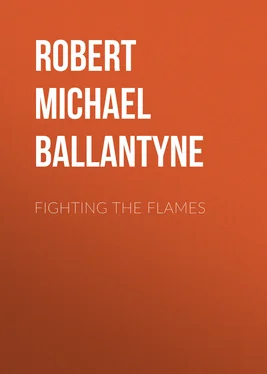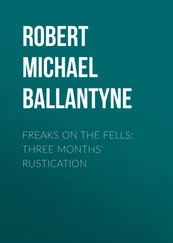Robert Michael Ballantyne - Fighting the Flames
Здесь есть возможность читать онлайн «Robert Michael Ballantyne - Fighting the Flames» — ознакомительный отрывок электронной книги совершенно бесплатно, а после прочтения отрывка купить полную версию. В некоторых случаях можно слушать аудио, скачать через торрент в формате fb2 и присутствует краткое содержание. Жанр: foreign_children, literature_19, foreign_antique, foreign_prose, на английском языке. Описание произведения, (предисловие) а так же отзывы посетителей доступны на портале библиотеки ЛибКат.
- Название:Fighting the Flames
- Автор:
- Жанр:
- Год:неизвестен
- ISBN:нет данных
- Рейтинг книги:4 / 5. Голосов: 1
-
Избранное:Добавить в избранное
- Отзывы:
-
Ваша оценка:
- 80
- 1
- 2
- 3
- 4
- 5
Fighting the Flames: краткое содержание, описание и аннотация
Предлагаем к чтению аннотацию, описание, краткое содержание или предисловие (зависит от того, что написал сам автор книги «Fighting the Flames»). Если вы не нашли необходимую информацию о книге — напишите в комментариях, мы постараемся отыскать её.
Fighting the Flames — читать онлайн ознакомительный отрывок
Ниже представлен текст книги, разбитый по страницам. Система сохранения места последней прочитанной страницы, позволяет с удобством читать онлайн бесплатно книгу «Fighting the Flames», без необходимости каждый раз заново искать на чём Вы остановились. Поставьте закладку, и сможете в любой момент перейти на страницу, на которой закончили чтение.
Интервал:
Закладка:
This reply went a long way in Mr Auberly’s mind to prove the truth of his assertion.
“Answer me, boy,” said Mr Auberly with an impressive look and tone; “were you sent here by a fireman?”
“Yes, sir,” replied Willie.
“What is his name?”
“Same as mine, sir—Willders.”
“Of course, of course,” said Mr Auberly, a little confused at having put such an unnecessary question. “Does your mother know you’re here?”
This brought the slang phrase, “Does your mother know you’re out?” so forcibly to the boy’s mind, that he felt himself swell internally, and had recourse again to his pocket-handkerchief as a safety-valve.
“Yes, sir,” said he, on recovering his composure; “arter I saw Blazes—Frank, I mean, that’s my brother, sir—I goes right away home to bed. I stops with my mother, sir, an’ she saw me come off here this mornin’, sir. She knows I was comin’ here.”
“Of course; yes, yes, I see,” muttered Mr Auberly, again taking up his pen. “I see; yes, yes; same name—strange coincidence, though; but, after all, there are many of that name in London. I suppose the other boy will be here shortly. Very odd, very odd indeed.”
“Please, sir,” observed Willie, in a gentle tone, “you said I was the other boy, sir.”
Mr Auberly seemed a little annoyed at his muttered words being thus replied to, yet he condescended to explain that there was another boy of the same name whom he expected to see that morning.
“Oh, then there’s another other boy, sir?” said Willie with a look of interest.
“Hold your tongue!” said Mr Auberly in a sharp voice; “you’re a fool, and you’re much too fond of speaking. I advise you to keep your tongue quieter if you wish to get on in life.”
Willie once more sought relief in his pocket-handkerchief, while his patron indited and sealed an epistle, which he addressed to “Miss Tippet, Number 6, Poorthing Lane, Beverly Square.”
“Here, boy, take this to the lady to whom it is addressed—the lane is at the opposite corner of the square—and wait an answer.”
“Am I to bring the answer back to you, sir?” asked Willie with much humility.
“No; the answer is for yourself,” said Mr Auberly testily; “and hark ’ee, boy, you need not trouble me again. That note will get you all you desire.”
“Thank you, sir,” said Willie, making a bow, and preparing to retire; “but please, sir, I don’t very well know, that is to say—ahem!”
“Well, boy?” said the patron sternly.
“Excuse me, sir; I can’t help it, you know; but please, sir, I wish to explain about that other boy—no, that’s me, but the other other boy, you know—”
“Begone, boy!” cried Mr Auberly in a voice so stern that Willie found himself next moment in the street, along which he ran chuckling worse than ever.
A little reflection might have opened Mr Auberly’s eyes to the truth in regard to Willie, but a poor relation was to him a disagreeable subject of contemplation, and he possessed the faculty, in an eminent degree, of dismissing it altogether from his mind. Having care enough on his mind at that time, poor man, he deliberately cast the confusion of the two boys out of his thoughts, and gave himself up to matters more interesting and personal.
We may add here that Mrs Willders was faithful to her promise, and never more addressed her brother-in-law by word or letter. When Willie afterwards told her and Frank of the absurdity of his interview, and of the violent manner in which Mr Auberly had dismissed him when he was going to explain about the “other” boy, his mother thought it best to let things rest as they stood, yet she often wondered in her own quiet way what Mr Auberly would think of her and of the non-appearance of the “other” boy; and she felt convinced that if he only put things together he must come to understand that Willie and Frank were her sons. But Mrs Willders did not know of the before-mentioned happy facility which her kinsman possessed of forgetting poor relations; so, after wondering on for a time, she ceased to wonder or to think about it at all.
Chapter Seven
Thoughts in regard to Men
Miss Emelina Tippet was a maiden lady of pleasing countenance and exceedingly uncertain age.
She was a poor member of a poor branch of an aristocratic family, and feeling an unconquerable desire to breathe, if not the pure unadulterated atmosphere of Beverly Square, at least as much of it as was compatible with a very moderate income, she rented a small house in a very dark and dismal lane leading out of that great centre of refinement.
It is true that Beverly Square was not exactly the “West End,” but there are many degrees of West-endiness, so to speak, in the western neighbourhood of London, and this square was, in the opinion of Miss Tippet, the West-endiest place she knew, because there dwelt in it, not only a very genteel and uncommonly rich portion of the community, but several of her own aristocratic, though distant, relations, among whom was Mr Auberly.
The precise distance of the relationship between them had never been defined, and all records bearing on it having been lost in the mists of antiquity, it could not now be ascertained; but Miss Tippet laid claim to the relationship, and as she was an obliging, good-humoured, chatty, and musical lady, Mr Auberly admitted the claim.
Miss Tippet’s only weakness—for she was indeed a most estimable woman—was a tendency to allow rank and position to weigh too much in her esteem. She had also a sensitive abhorrence of everything “low and vulgar,” which would have been, of course, a very proper feeling had she not fallen into the mistake of considering humble birth lowness, and want of polish vulgarity—a mistake which is often (sometimes even wilfully) made by persons who consider themselves much wiser than Miss Tippet, but who are not wise enough to see a distinct shade of true vulgarity in their own sentiments.
The dark, dismal lane, named Poorthing Lane, besides forming an asylum for decayed and would-be aristocrats, and a vestibule, as it were, to Beverly Square, was a convenient retreat for sundry green-grocers and public-house keepers and small trades-people, who supplied the densely-peopled surrounding district, and even some of the inhabitants of Beverly Square itself, with the necessaries of life. It was also a thoroughfare for the gay equipages of the square, which passed through it daily on their way to and from the adjoining stables, thereby endangering the lives of precocious babies who could crawl, but could not walk away from home, as well as affording food for criticism and scandal, not to mention the leaving behind of a species of secondhand odour of gentility such as coachmen and footmen can give forth.
Miss Tippet’s means being small, she rented a proportionately small residence, consisting of two floors, which were the upper portion of a house, whose ground floor was a toy-shop. The owner of the toy-shop, David Boone, was Miss Tippet’s landlord; but not the owner of the tenement. He rented the whole, and sublet the upper portion. Miss Tippet’s parlour windows commanded a near view of the lodging opposite, into every corner and crevice of which she could have seen, had not the windows been encrusted with impenetrable dirt. Her own domestic arrangements were concealed from view by small green venetian blinds, which rose from below, and met the large venetians which descended from above. The good lady’s bedroom windows in the upper floor commanded a near view—much too near—of a stack of chimneys, between which and another stack, farther over, she had a glimpse of part of the gable end of a house, and the topmost bough of a tree in Beverly Square. It was this prospect into paradise, terrestrially speaking, that influenced Miss Tippet in the choice of her abode.
Читать дальшеИнтервал:
Закладка:
Похожие книги на «Fighting the Flames»
Представляем Вашему вниманию похожие книги на «Fighting the Flames» списком для выбора. Мы отобрали схожую по названию и смыслу литературу в надежде предоставить читателям больше вариантов отыскать новые, интересные, ещё непрочитанные произведения.
Обсуждение, отзывы о книге «Fighting the Flames» и просто собственные мнения читателей. Оставьте ваши комментарии, напишите, что Вы думаете о произведении, его смысле или главных героях. Укажите что конкретно понравилось, а что нет, и почему Вы так считаете.












